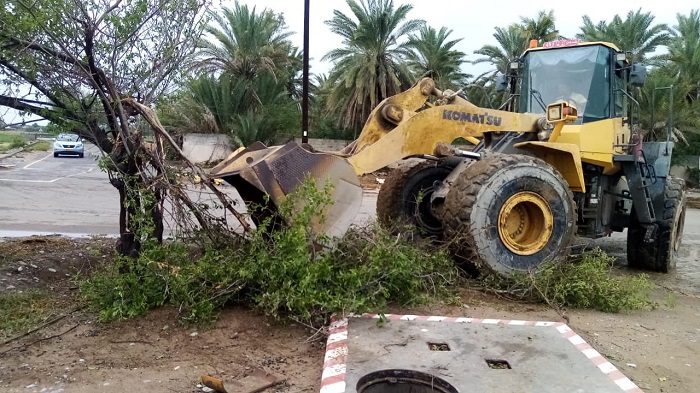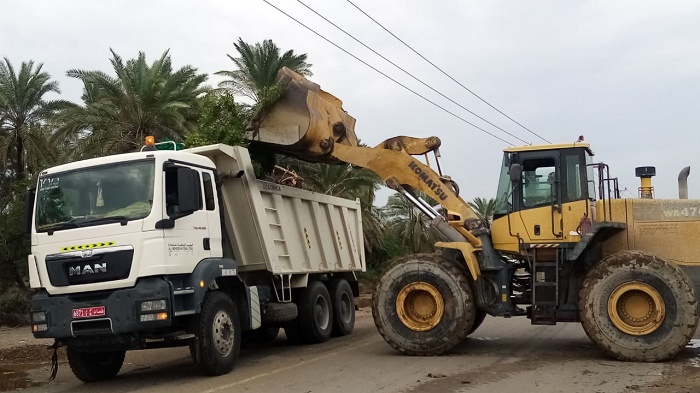

Muscat: Maintenance and repair crews worked tirelessly on cleaning up the flooding and debris left behind by cyclone Shaheen, and restore critical infrastructure in areas that faced the brunt of the extreme weather.
For Monday's updates on Cyclone Shaheen, check our tracker here.
Shaheen, which made landfall between Musannah and Suwaiq in North Al Batinah on Sunday night, was accompanied by torrential rains, winds at speeds of 120 kmph, and severe flooding, while the surrounding regions also suffered from its impact, albeit on a lesser scale.
The cyclone led to plenty of debris in the form of trees and rocks falling onto roads and people’s homes, leading to obstruction and damage to property, in some cases, rather severely. As a precaution, electricity was cut off to the town of Suwaiq, while Khabourah, Barka and Musannah also experienced power cuts.
Read also: Damage assessment underway in South Al Batinah
Shaheen has also led to loss of life: Oman News Agency reported at least seven deaths in North Al Batinah, while search and rescue crews combing Wadi Al Sail in Rustaq in South Al Batinah found another person dead.
Sadly, search teams also found a child who had died in a flooded area of Amerat, while two workers lost their lives when a housing complex collapsed in Rusayl.
Rescue teams continue to search for persons reported missing, both from the ground, and with the assistance of helicopter crews from the Royal Oman Police and Sultan’s Armed Forces.
“Since this morning, teams from the Civil Defence and Ambulance Authority have dealt with more than 200 reports of citizens requiring help because their homes have been flooded,” said Lt. Col. Matar Al Makhmari, the director of operations at North Al Batinah Police Command, speaking on Monday to Oman News Agency. “Teams involved with the provision of basic services such as electricity are also attempting to restore power to the affected areas.
Adding to this, Sulaiman Al Sunaidi, the director of North Al Batinah Municipality, said, “We have started removing the trees that have fallen onto the roads, and the mud that has been deposited onto the streets because of the continuous flow of water in wadis.”
The National Committee for Emergency Management has announced that the direct effects of the cyclone have ended, but people are still requested to stay away from wadis and low-lying areas that are prone to flooding, as well as places inundated with water.
Eyewitnesses in North Batinah told Times of Oman of the fear they felt when cyclone Shaheen reached its zenith on Sunday night. Among them was Sujith S, a heavy vehicle driver living in a flat in Khabourah that he shared with his colleagues.
“At night, the wind was howling furiously…we all just stayed close together, wondering how long it would take for the situation to die down,” he said. “The waters had flooded the first and ground floors of our building, and there were fast-flowing wadis on three sides of our building, so there was no way for us to get out.
“My brother in Qatar tried to call people for help the next morning, but fortunately, by then, the rescue work had started,” he added. “The street in front of our home was fully inundated with water, so there was no way for the emergency teams to reach us immediately, but we were told that we would be able to leave in a few hours’ time.”
Wasim Ali, another expatriate, said he was asleep when he first felt the impact of the cyclone at 1:30 in the early hours of Monday morning, which had caused the electricity to go out.
“It was horrible: I opened my door and I was surprised to see water just outside, because I live far away from the sea, in an area close to the local markets,” he said. “I woke up with a start because I suddenly felt very warm.”
He added that although the situation had improved by Monday afternoon, there was no electricity at the time, and shopkeepers had returned to their stores to clean them after the flooding had deposited plenty of mud and debris within. Hotels and restaurants also remained closed.
An Omani national in Saham said she had tried to get in touch with her friends in Suwaiq and Khabourah, but the lack of electricity in both towns meant mobile phone connectivity was very poor.”
“We have tried time and again to contact them, but we are unable to,” she said.
“Fortunately, in Saham, it is not that bad, but all of my friends in these places (Suwaiq and Khabourah) say their property has been badly damaged, although thankfully they are all safe. Wadis also continue to flow swiftly near their homes, so the situation on the ground is still not fully resolved.”
People in Muscat also faced property damage due to flooding and falling debris. Mohammed Rehman, who lives in Wadi Kabir, was called to assist when the basement of the apartment complex opposite his own, rapidly flooded with rainwater.
“All of the cars parked there are new, so there are going to be a lot of concerned and worried owners,” he said.
“We procured a pump and began to extract water from the basement…it has been running since Sunday night. All of us were shocked to see the water pouring in so quickly.”
By the time Mohammed and his associates began extracting the water, it had reached a height of five feet. They had reduced that to about two feet by Monday evening, but he admitted it would take until the wee hours of Tuesday morning to completely remove all the water.
Another person who has to now deal with Shaheen’s impact is Pakistani national Nadeem Bhalli, whose car suffered extensive damage when a communication tower damaged his engine, dislocated his front left wheel cover and bumper, and shattered his windscreen.
“There is a mobile communication tower above our flat in Boushar, whose base is embedded into a concrete block for extra security,” he said. “I parked my car in an area I thought was safe, but the wind was so ferocious at night that it completely tore the concrete block and tower from its foundations. The tower landed on my car, and I was dismayed to see the condition of my vehicle in the morning.
“I do not know how much this is going to cost me, or who will take care of the damages: my car has third-party insurance, so I will be approaching the telecom company that installed this tower for either compensation to buy a new car, or to repair this one,” he added.
“I have informed the ROP of this incident: they will come on Tuesday morning to assess the damage, and I will then go to the insurance company to begin my compensation claim.”
Nadeem knows, however, that it will take time before he is able to drive his car, as he thinks the insurance claims will take two or three months to investigate.
“In the meantime, I do not think I can go for a rental, because that will cost me about OMR150 a month, which is quite a lot of money,” he admitted. “I have to ask my company for one of their cars.”